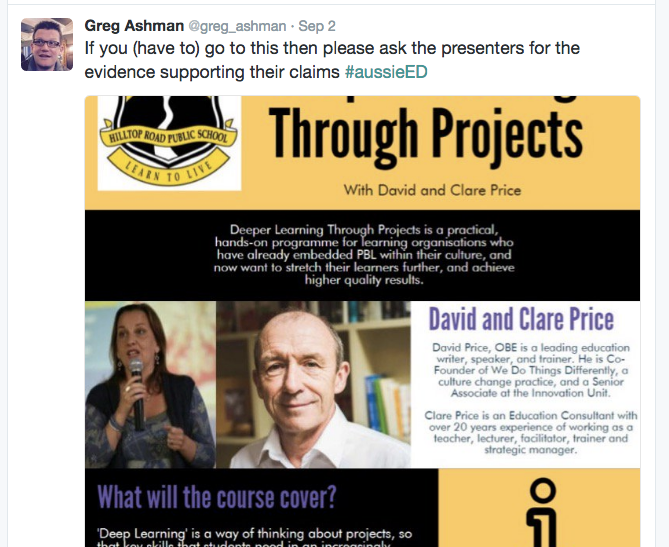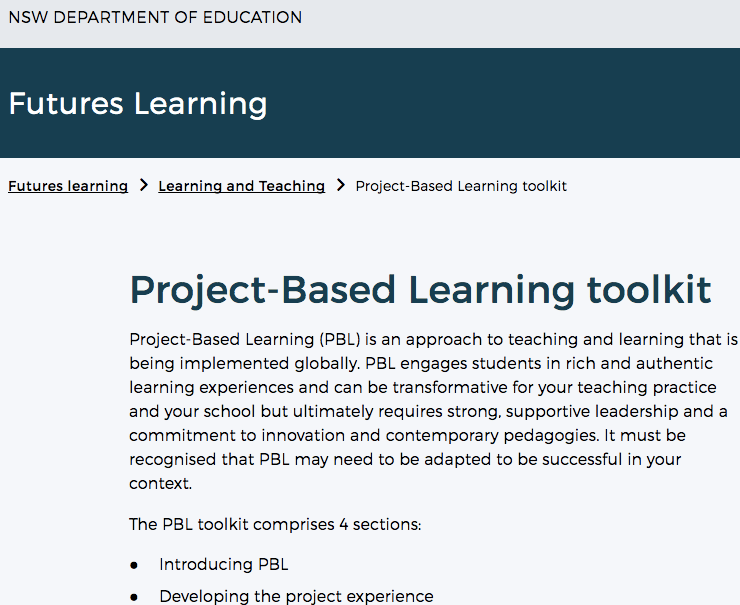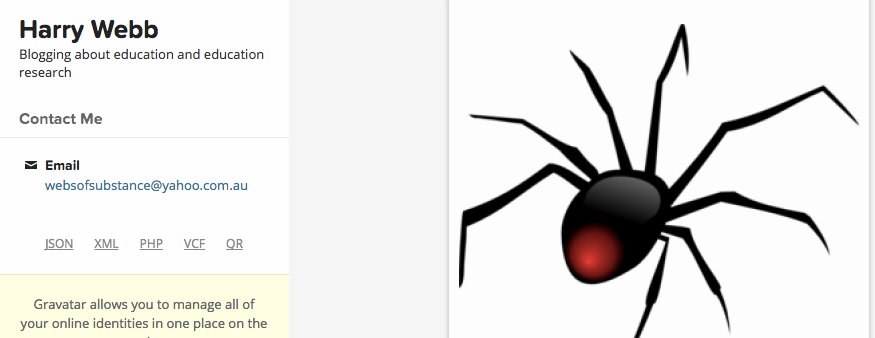Recently I wrote a blog post about the aggressive tone of some teachers on Twitter. I had ten times the number of views compared with any previous post, so I assume it struck a chord. Because one of the stock defences by such people when challenged is to complain of ‘ad hominem’ personal attacks, I made no direct references to individuals. I’d still rather not, but a post at the weekend by Greg Ashman (a teacher from an independent school in Ballarat, Victoria) has given me no option but to respond in-kind.
Mr Ashman had come across a flyer for our new programme  “Deeper Learning Through Projects” and tweeted me to ask why there was no evidence quoted for the effectiveness of project-based learning on the flyer. I replied “It’s a flyer Greg, not a research paper”. In a civilised world that might have been the end of it. But very soon thereafter Mr Ashman wrote this blog post, naming me as the person that the NSW governments is spendin
“Deeper Learning Through Projects” and tweeted me to ask why there was no evidence quoted for the effectiveness of project-based learning on the flyer. I replied “It’s a flyer Greg, not a research paper”. In a civilised world that might have been the end of it. But very soon thereafter Mr Ashman wrote this blog post, naming me as the person that the NSW governments is spendin g ‘thousands of taxpayer dollars’ on to deliver training.
g ‘thousands of taxpayer dollars’ on to deliver training.
He then ‘reported’ me, by tweeting his post to the NSW Department for Education, BOSTES (a teacher accreditation agency in Australia) and the Victorian Minister for Education. I’m investigating the potential for defamation in his actions, but I want to use this post as an opportunity to put the record straight, before returning to the consequences of people who use Twitter to malign other educators. It’s worth pointing out however that, should Mr Ashman think he was warning NSW DoE ‘off’ the dangers of project based learning, that last year the NSW Department for Education didn’t just hire me as keynote speaker for their annual schools conference ‘Inspire, Innovate’, they also hired me to run project based learning workshops for government schools. They’ve also got one of the best government websites featuring teacher support for PBL 
I tweeted that Mr Ashman was factually inaccurate and displaying a misunderstanding of what project-based learning was, and here’s why:
In his original post, and a subsequent post, he frequently conflates Problem Based Learning with Project Based Learning, when they are very different things – he even says himself that they are ‘not necessarily the same thing’. There’s no necessarily about it, Greg. They’re different. He also describes Project Based Learning as a ‘teaching method’, when it’s not. I freely admit that project-based learning struggles to define itself accurately (no inconsistency there – ‘direct instruction’ and ‘creativity programs’ cover a multitude of sins too). So, in the absence of a copper-bottomed definition, we are left to define it individually. Mine would be that project based learning incorporates a variety of teaching and learning approaches to support students in the acquisition of knowledge and skills, through the creation of purposeful products and services. In other words, it attempts to create the same context that most of us experience in our working lives – we learn through working on projects. In training, I ask teachers to think of it as a ‘wraparound’, and the Buck Institute refer to it as an ‘envelope’ that encompasses a range of pedagogies.
Of course there’s good and bad project based learning (as there is good and bad in any approach to learning – it’s contingent upon the teachers ability to design, scaffold and support the learning). Which is why I always say that, personally, I would prefer that teachers deployed direct explicit instruction well, than project based learning badly.
Mr Ashman says that there’s very little evidence of project based learning’s effectiveness quoted on my website. That’s true. That’s because I believe that busy teachers don’t have time to plough through footnotes, references and sidebars. I had a lot more citations in my book, OPEN, but my editor told me to thin them down as it was becoming indigestible, and I had always wanted to write a book that any parent, teacher or student could read (1) . Additionally, if he had bothered to attend any of our training events he would see that I cite evidence quite a bit and every school attending our training receives a usb with a resource pack containing teacher guides, tools, articles and a comprehensive literature review of the research on project-based learning. If Mr Ashman had spent five minutes googling for ‘evidence’ (we’ll come to the problems with evidence in a moment) he would have found it himself. I have added some references at the end of the post for those who see that as the sole yardstick.
To support his criticism of project based learning, Mr Ashman then cites two key texts: Hattie’s ubiquitous ‘Visible Learning’ and a 2006 study by Kirschner, P. A., et al. I can find no direct reference to project based learning anywhere in Visible Learning, and the Kirshner is entitled Why Minimal Guidance During Instruction Does Not Work: An Analysis of the Failure of Constructivist, Discovery, Problem-Based, Experiential, and Inquiry-Based Teaching. So, on the one hand he is arguing that I have no evidence, and his ‘evidence’ is to cite two texts that don’t even investigate project based learning.
There are many concerns about the way in which Hattie’s now-seen-as-seminal book was both put together and subsequently deployed (see here, here, and here (2)) but there’s no denying its clout. Without direct references to projects in Visible Learning we have to look at what our deeper learning training is about and how that figures in Hattie’s top approaches, based on effect size.
The deeper learning training that I run offers tools, scaffolds, and try-outs of a number of approaches that I feel support deeper learning through projects:
- Socratic Seminars – these are facilitated class room discussions – ranked #7 in Hattie’s effect size
- Peer (and teacher) feed-back – we look at a variety of critiques – ranked #10
- Examples of ‘on-demand’ direct instruction – closely related to ‘micro-teaching’ ranked #6
- Students critiquing texts – closely aligned with reciprocal teaching’ ranked #14
- Multiple drafting – aligned to spaced practice ranked #27
- Developing oracy skills – not covered by Hattie, but should be)
- Scaffolding student research and critical thinking
- Meta-cognitive strategies (self reflection through presentations of learning)
- In addition to coaching in these strategies, the training also puts teachers in the shoes of learners through the completion of a project – in the current programme, creating/publishing a 30pp ‘book’ showing their research, hypotheses, writing and predictions.
There is a perception held by some (and I suspect Mr Ashman is one) that see project based learning as an environment where students are largely left to their own devices. And, in fairness, that used to be the case in some of the worst examples propagated during the 1980’s. But the field has advanced significantly since then – it’s just that others haven’t caught up. A classic misconception was brought home to me when I took a group of British teachers over to see the High Tech High schools in San Diego. One teacher gleefully reported back “I saw someone giving a lecture!” as though this were anathema to good PBL practice. The ‘lecture’ in question was being given by Dr Jay Vavra, a renowned scientist before joining High Tech High. It was a classic example of ‘micro-teaching’ – a short injection of direct instruction. But the point of departure between myself and the direct instruction folks seems to be that they believe that students can’t begin to work on projects until they’ve been taught everything they will need to know. What Dr Vavra was doing was teaching ‘in the moment of need’, as the students had encountered a problem that could only be solved by an injection of knowledge. Such responses are entirely consistent with good project based learning practice.
The last point I want to make on Mr Ashman’s post was the insinuation that I ‘could be encouraging teachers to use an approach that leads to less equitable outcomes.’ Now, I consider myself a reasonable person, but I don’t need lectures on equity from teachers who are working in schools charging $18,000 per student, and whose students start with a considerable advantage over kids from low SES backgrounds. Don’t get me wrong, I occasionally train teachers in independent schools and I have no problem with them. But practitioners working in these schools should be very careful when making judgements on equity. Ironically, I read Mr Ashman’s second post while working in a special needs support unit in NSW, who attended our training, instigated PBL and have seen remarkable improvements in their students cognitive abilities since introducing PBL (alongside the existing direct instruction). But that’s just personal testimony, and doesn’t count, I suppose. The evidence for PBL and equity (summarised below) exists, but the most powerful evidence is in the outcomes of schools that have based their entire curriculum around a project base. High Tech High (13 schools) and the Expeditionary Learning schools (152 schools) in the US are two of the most prominent examples. Despite having higher than average numbers of students from economically disadvantaged backgrounds (HTH are close to the Mexican border and EL schools are almost all inner city schools) High Tech High student’s college acceptance rates, over an eight year period, have been between 80-90%; 13 of EL’s 31 high schools had a 100% college acceptance rate in 2014.
This data matters to teachers – perhaps more so than heavily averaged generalised interventions listed in Visible Learning – and Mr Ashman demeans himself by offering no evidence on equity and project based learning.
Since he made his criticisms personal, I have to say that I have now spent some time looking at Mr Ashman’s twitter feed and blog and I find it sad and depressing that a teacher would take such apparent pleasure out of what is essentially a deficit view of teaching. His posts seem to fixate upon what doesn’t work , according to his selective use of ‘evidence’, rather than putting his own practice forward, and letting teachers decide if it’s for their kids or not. And his previous history on social media does him no favours. He used to tweet and blog anonymously under the alias of Harry Webb, and Webs of Substance (just to make the rest of us feel inadequate) and, so I’m told, was rather less circumspect than he is now. We have no way of verifying that, since he closed his Twitter account, deleted all the tweets, and his former blog is now locked away (you have to be vetted by him before you can see his posts) He took this action, apparently, because ‘ I didn’t want to have to think about whether something I wrote was in line with my own school’s approach.’
So, presumably now that he’s emerged into the open, his views ARE in line with his school’s approach? If so I feel sad that a school would pour scorn on the gullible fools that attended our PBL training – over 500 teachers in Australia and many more around the world. I’ve said it before, but I’ll say it again: teachers cannot hide behind that ‘all views my own’ smokescreen. When teachers tweet, they are inevitably representing their school, so they should consider that before making unsubstantiated claims, and rounding on their peers.
I’d like to close with a challenge to Mr Ashman: I believe in the professional judgement of teachers, so I put what I believe works, supported by evidence, into my training programmes, and let attendees judge what might be right for their students. I’d invite him to do the same: first, have the courage of your convictions to make your previous tweets and blog public; second, put your own practice up for review by running training programmes, and then we can, in the words of Bing Crosby, accentuate the positive and eliminate the negative.
_______________________________
Research Notes:
As I said in the main body, there is more research needed into what makes for effective project based learning teaching. But it’s not as barren a field as Mr Ashman argues. Here are just some of the studies carried out:
On the positive associations between a Project-Based Learning approach and students’ development of knowledge and cognitive skills :
Parker, W. C., Lo, J., Yeo, A. J., Valencia, S. W., Nguyen, D., Abbott, R. D., Nolen, S. B., Bransford, J. D., & Vye, N. J. (2013). Beyond breadth-speed-test: Toward deeper knowing and engagement in an advanced placement course. American Educational Research Journal, 50(6), 1424-1459.
Harris, C. J., Penuel, W. R., DeBarger, A. H., D’Angelo, C., & Gallagher, L. P. (2014). Curriculum materials make a difference for next generation science learning: Results from Year 1 of a randomized controlled trial. Menlo Park, CA: SRI International.
Gültekin, M. (2005). The effect of project based learning on learning outcomes in the 5th grade social studies course in primary education. Educational Sciences, Theory and Practice, 5(2), 548-557.
Mioduser, D., & Betzer, N. (2007). The contribution of project-based learning to high achievers’ acquisition of technological knowledge and skills. International Journal of Technology and Design Education, 18(1), 59-77.
On the positive effect on SES, SEN and ESL students:
Halvorsen, A-L., Duke, N. K., Brugar, K. A., Block, M. K., Strachan, S. L., Berka, M. B., & Brown, J. M. (2012). Narrowing the achievement gap in second-grade social studies and content area literacy: The promise of a project-based approach. Theory and Research in Social Education, 40, 198-229.
Filippatou, D., & Kaldi, S. (2010). The effectiveness of project-based learning on pupils with learning difficulties regarding academic performance, group work and motivation. International Journal of Special Education, 25(1), 17-26.
Campbell, S. A. (2012). The phenomenological study of ESL students in a project-based learning environment. International Journal of Interdisciplinary Social Sciences, 6(11), 139-152.
____________________
Footnotes:
- Access matters. Mr Ashman wrote in a post that he was happy with sales of 70 (seventy) of his book ‘Ouroboros’ (yes, I had to look it up too). Bizarrely, he removed his book from Amazon because he was unhappy with the royalty he was receiving. The kindle version of my book is currently around half the price of Mr Ashman’s, and 25% of my sales (currently close to 40,000) have been heavily discounted.
-
This highly critical review of Hattie’s maths and methodology contains a comment by ‘Harry Webb’ describing it as an excellent post. Harry Webb is Greg Ashman’s former alias, so one is left wondering whether he approves of Visible Learning’s methodology or not.







How exactly do students move from pedagogy to heutogogy if not through experiential learning? (Try and teach someone to ski independently only using theory). At the same time, the collaborative experience – learning and developing a variety of so-called “soft” skills along the way – is best supported, as you rightly say, by direct instruction. Is there a wholly traditional or wholly progressive way of achieving these outcomes? I doubt it and I’ve never come across anyone who could convince colleagues. Even Hattie has had to take a careful few steps back in the assumptions coming from, let’s be honest, what is an outstanding piece of work (VL). However, as VL is steadily examined, many, many approaches are demonstrably effective when applied to appropriate contexts (a critical missing piece from the VL data).
I’ve been part of many PBL attempts over the years with enthusiastic and sceptical peers and would agree Ross, there are some pitiful examples where kids were afforded too much freedom and some where the challenges were too prescriptive. Somewhere in between lies a goldmine of learning on a deeper level that teachers with allegiance/preference to either side of the debate can collaborate in ensuring learning is the winner (and therefore children!).
I also agree that this polarising, and often deeply personalised, criticism is not doing the furtherance of what actually works any good at all. It in fact only polarises OPINIONS – as none of us really know what works completely because, if we did, there would be no debate. Open minds will be required to move the debate into a more collaborative dynamic so that our shared goal of becoming an evidence based profession is achieved. I watched the film of the ⌗TLCresearch held in the summer which excellently accentuated the need to get off our high horses and develop professional learning communities. We can’t do this by working to a deficit model whilst sitting on I am right you are wrong islands!
Another well considered contribution (in my humble opinion).
Great comments! Thanks so much for taking the time to make them.
I have no issues whatsoever with Project Based Learning, indeed it was put to me when I first trained as a teacher that there often many ways to achieve a learning outcome. Project Based Learning has it’s moments as does Problem Based Learning. As learning is intended by nature to allow people to solve problems, it seems reasonable to me that Problem Based Learning should in principle be a reasonable way to approach the thing.
Turning to Greg, he has nailed his colours to the mast repeatedly. He seems to have a profound dislike of pure discovery based learning and almost everyone I have ever seen debate the thing with him tends to agree with him that minimally guided instruction will often be inefficient or ineffective and in that they all agree with the K&S paper that Greg always wheels out. As a side note, I believe he has a PHD supervisor who was closely linked to said paper so maybe thing start to get a little blurred here.
When people explain that the “let them learn for themselves” approach does not exist but for the world of the educational weirdo (in most circumstances) he will start talking about Project Follow Through (yawn).
I guess PHD candidates have to be a little blinkered but unfortunately Greg has developed the “lalala i am not listening” theory of learning into an art form. Many people resist the urge to interact with Harry…(sorry Greg), but you unfortunately are on the receving end of his closed mindedness and obsession with Discovery Learning and you really must respond. I think you have been very restrained in your reply.
Over the years I must have seen this on dozens of occasions…..
1 Someone blogs about their successful approach to teachinglearning
2 Greg comments that their approach is bordering on criminal and the Kirschner and Sweller paper and Project Follow Through show
3 Original blogger explains that neither of these pieces of academic work have any real relevance
4 Other obsesive gloggers who favour “traditional” approaches come to Greg’s rescue slagging off all of those progressives who love group work and discovery
5 People lose interest and Greg moves on to a new victim
I appreciate that research can sometimes illuminate situations and improve understanding, but for most teachers their practice is mostly a matter of experience and common sense, a bit like the way that parents teach their children to be people.
I remain fascinated by the tensions between the “everything we do must be proven by research first” and the “I just know” brigade. Until this one is resolved I will contiune to use Project Based Learning as a weapon in my armoury and I will certainly now search out your book.
I also wish Greg every success with his PHD which I assume for him is an exercise in discovery.
Keep at it David. The proof of the pudding is in the learning and I am sure your learners don’t fret about K&S or Hattie when they experience success.
Sorry, but I’m struggling to see where Mr Ashman made this a personal attack. It seems, from what you’ve said, that he asked you to present evidence that PBL is effective before releasing it wholesale into class rooms. From what you’ve written here it seems that you are the person who is attacking Mr Ashman in a personal way and delving into hi personal life rather than addressing the question. I am certainly not well qualified enough to understand the intricacies of research in education but Mr Ashman has “addressed” the research you put forward and I must agree that it does seem rather underwhelming. Further I am astonished that you would consider legal action over this matter! What do you mean Mr Ahsman “reported” you exactly?
Sarita,
Educators need to be cognisant of making claims about fellow professionals. Mr Ashman alerted key government agencies through his tweet to a blog post that argued that my approach was (potentially) damaging to students from lower SES, that I’d promoted training without provideing evidence of its effectiveness. In this he was quite wrong. I had assembled the evidence and present it to people in the training – he seemed upset that I hadn’t presented it in a flyer (incidentally, I didn’t actually prepare the flyer, but that’s not my defence here). He then presented ‘his’ evidence which conflated research on Problem Based Learning as though it were Project Based Leading. So, if the net result of these (perhaps unintentional) deceptions affect the numbers of people attending, I may have a case for defamation. (May, that’s why I’m taking advice).
His previous life as an anonymous tweeter is relevant in the interests of full disclosure.
Finally, I was merely inviting Mr Ashman to present his solutions positively instead of constantly telling the rest of us that we’re wrong.
Not sure how that amounts to a personal attack.
I also agree that you need to present the research/evidence prior to the course so that discerning educationalists/teachers can decide if the research is of the quality they should demand.
I understand it was not on your flyer but a link should have been made available so that potential “customers” can explore the evidence before deciding to attend your courses. Your web site, if you have one, should have this information freely available and accessible.
We don’t/shouldn’t generally buy a product until we have seen it.